2023: The best and worst year of Humza Yousaf's career
- Published
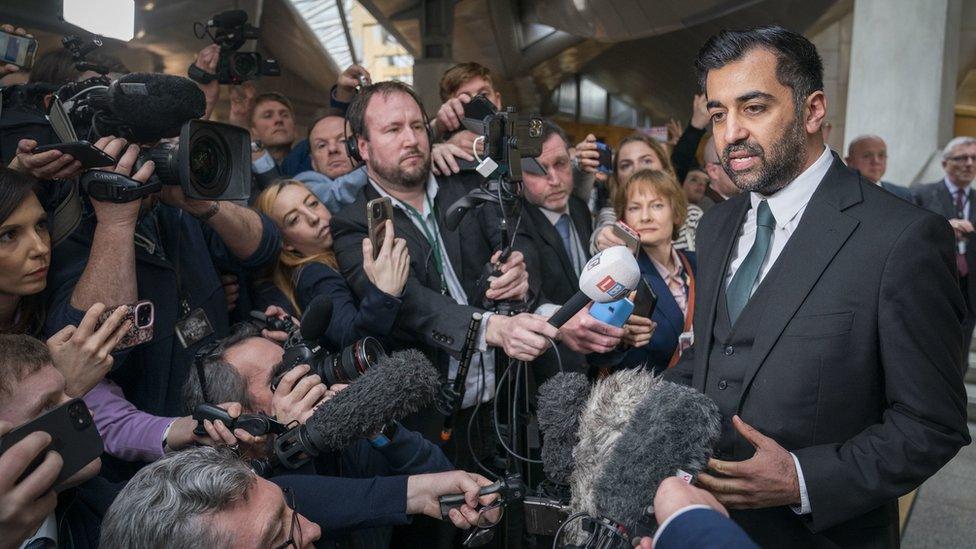
In theory, it has been the best year of Humza Yousaf's career. He has ascended the pinnacle of Scottish politics, landing his dream job as first minister.
But the circumstances have hardly been ideal. In fact it feels like almost everything else that could have gone wrong, has gone wrong.
What happened in Scottish politics in 2023, and what does it all tell us about Humza Yousaf?

In the space of 12 months, the SNP has changed leader and first minister, chief executive, president, Westminster leader, treasurer and communications chief.
It has been a period of remarkable change for a party headed by the man who was meant to be the "continuity candidate".
Nicola Sturgeon's resignation on 15 February came out of the blue for many, and the contest to replace her was a rapid, bruising and ultimately squeaky-tight affair.
After a series of other allies ruled themselves out, Health Secretary Humza Yousaf was happy to be seen as carrying on her legacy - a sensible move in a party still loyal to its figurehead.
But he came under sustained attack from his key rival, Kate Forbes, whose slogan was "continuity won't cut it" - a line that opposition leaders still quote back at Mr Yousaf.
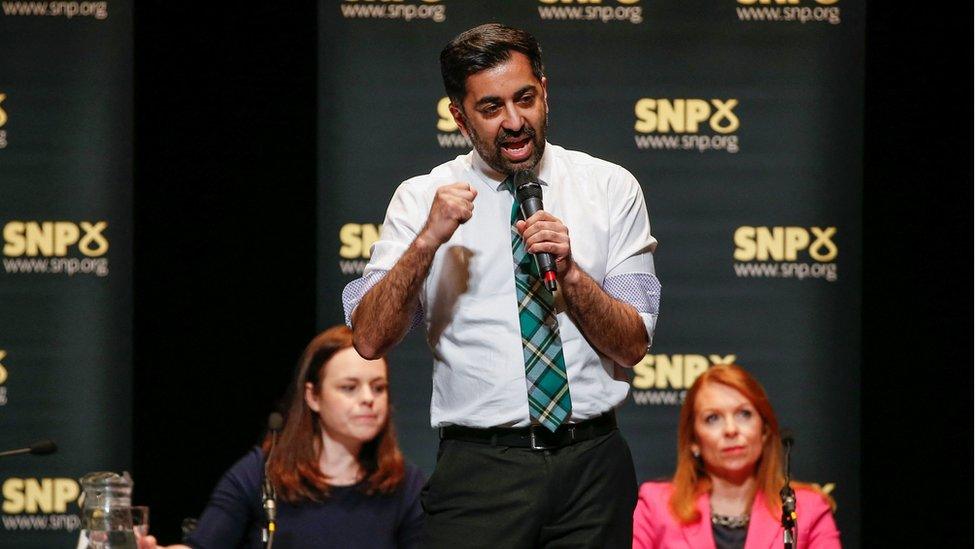
The SNP leadership contest was frequently a fiery affair
The once-slick party machine imploded during the contest, with communications chief Murray Foote and chief executive Peter Murrell quitting for misleading the public about membership figures.
Worse was to come when Mr Murrell - husband of Ms Sturgeon - was arrested as a suspect in an ongoing police investigation into the funding and finances of the SNP.
This involved the stunning sight of uniformed officers carrying stacks of boxes out of the party's HQ, and even erecting a blue forensic tent in the driveway of the former first minister.
Then-treasurer Colin Beattie and Ms Sturgeon were arrested for questioning too - and like Mr Murrell, were released without charge pending further inquiries.
Rather than savouring his narrow victory Mr Yousaf must have felt like the ceiling was falling in, as Operation Branchform overshadowed his every move.
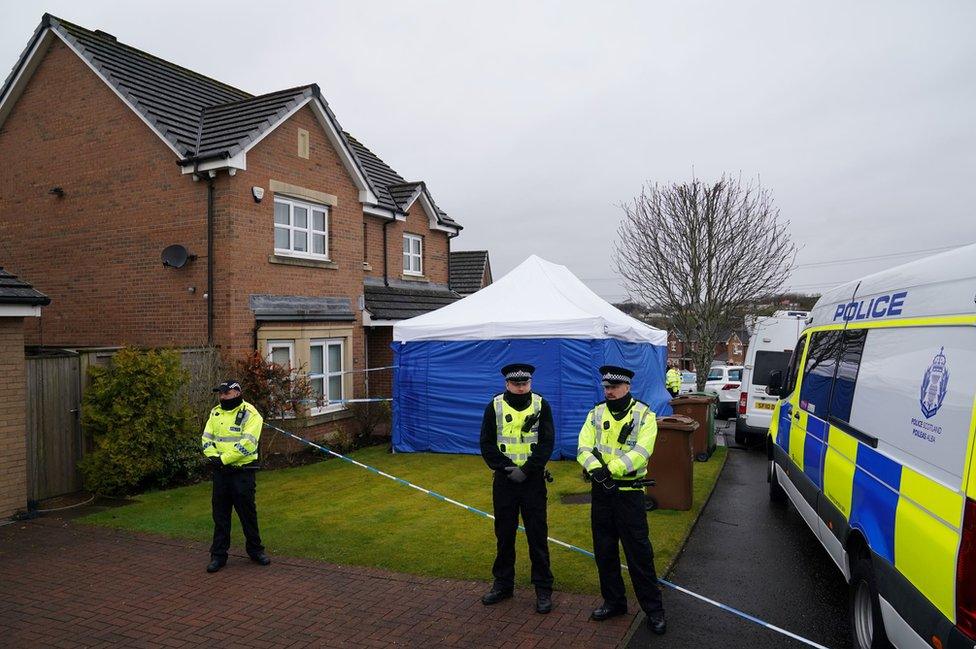
There was police activity outside Mr Murrell and Ms Sturgeon's home
He resisted any temptation to distance himself from Ms Sturgeon though, describing her as "the most impressive politician in Europe".
It remains to be seen how wise that was.
But for all the loyalty in words, in deeds Mr Yousaf has been far less sentimental about his role as continuity candidate.
He has shredded a series of policy commitments from the twilight of the Sturgeon era, with a ban on alcohol advertising and an expansion of Highly Protected Marine Areas being ditched outright.
The National Care Service was reduced in scope considerably and has drifted off into the next term of parliament, as has the Deposit Return Scheme.
Mr Yousaf initially stuck by Ms Sturgeon's commitment to challenge the UK government's veto of Holyrood gender reform legislation, but has now abandoned that too after the Court of Session ruled that the block was lawful.
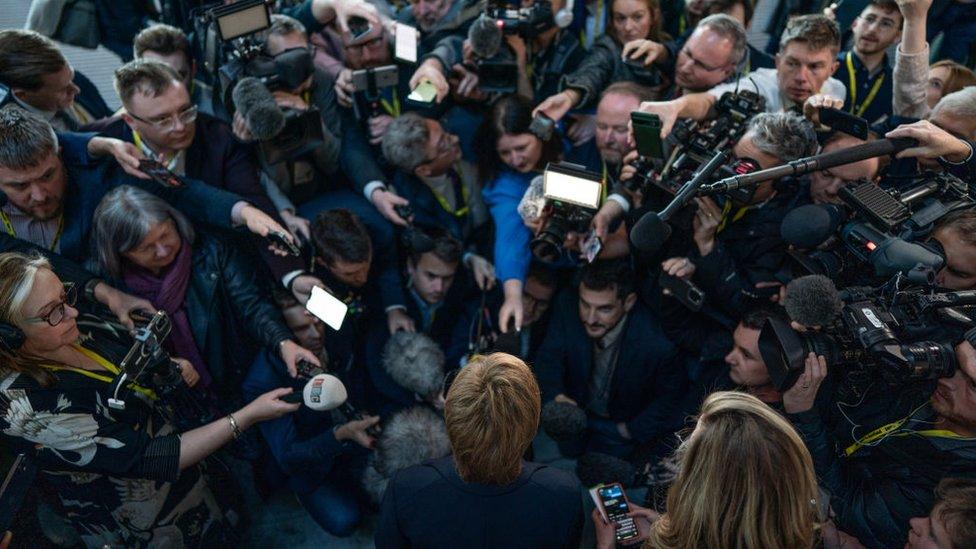
Nicola Sturgeon has often remained the centre of attention at key moments for Humza Yousaf
It is perhaps a sign of strength that Mr Yousaf felt able to bin so much of his predecessor's legacy. It briefly felt like he was clearing the decks to set out his own vision.
But there was nothing strikingly new in his first programme for government. The bills announced had almost all been consulted on already, or announced by Ms Sturgeon previously.
If there was a Yousaf Doctrine in there, it was about trying to combine a business-friendly pro-growth approach with a big-government interventionist one. To get the economy motoring to raise funds for the rapid expansion of the social security safety net.
That is easier said than done, and Mr Yousaf inherited a government in the midst of an inflation crisis, staring into a £1.5bn black hole in its finances.
That led to a budget steeped in pragmatism, coupling tax rises with funding cuts. The social justice policies at the core of Mr Yousaf's leadership bid were prioritised, as was the health service he used to run, but otherwise the settlement has pleased few.
The one thing he has retained is Ms Sturgeon's independence strategy - the old one, of seeking a mandate for a referendum via electoral wins, which ultimately failed to move the dial. Activists remain restless about the lack of clear direction.
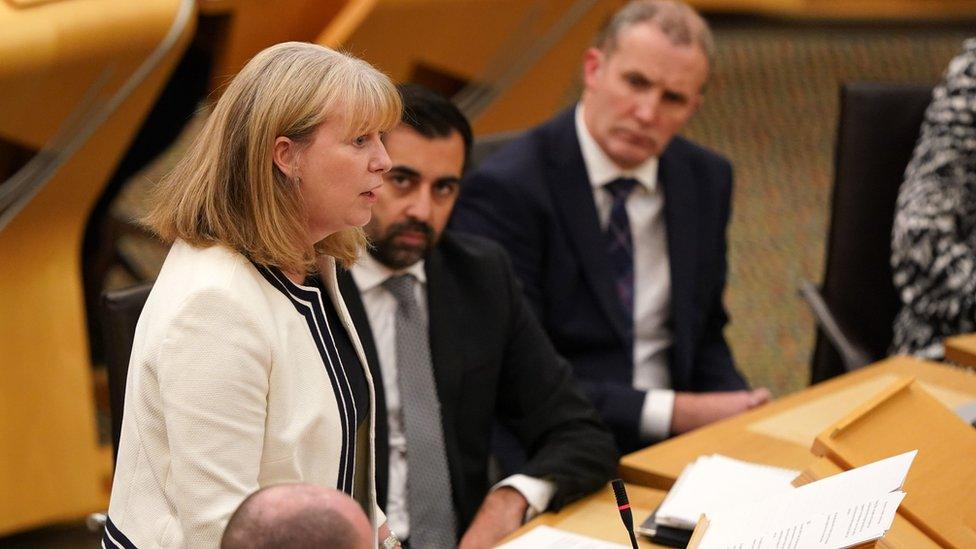
Shona Robison's budget was more about plugging gaps than radical changes
Mr Yousaf has perhaps been at his most first ministerial when dealing with intensely difficult circumstances, though.
When his wife's parents were trapped in Gaza at the outset of war, he was broadly seen to have handled the situation well.
He reached out to both the Jewish and Muslim communities, settled quickly on a position of personal principle, and articulated it well.
Other leaders had a harder time - and the SNP illustrated this at Westminster by forcing a vote on a ceasefire which sparked a Labour rebellion and a rash of front-bench resignations. It was the party's most notable manoeuvre in the Commons for years.
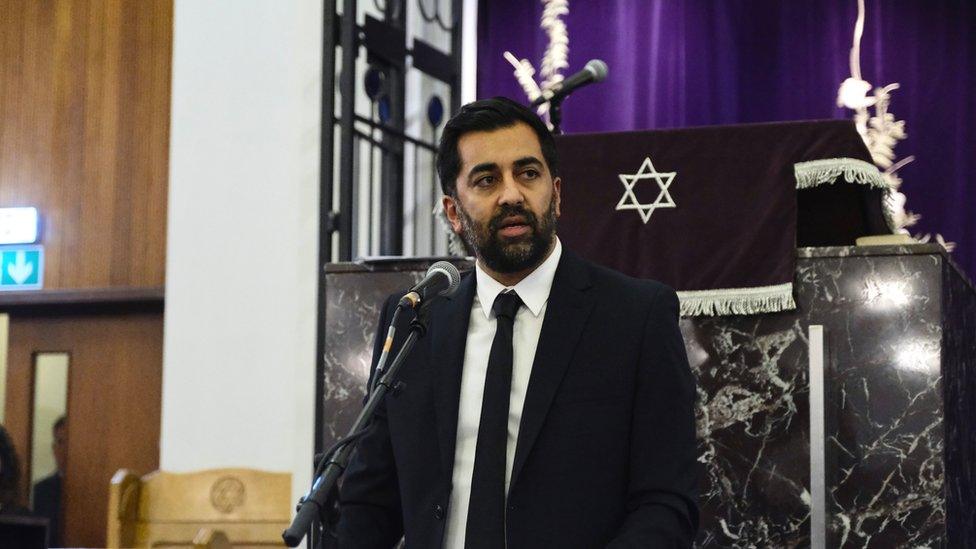
Humza Yousaf reached out to Scotland Jewish and Muslim communities while dealing with personal turmoil over Gaza
That stand-off with Labour will become the focus of Mr Yousaf's campaigning as SNP leader.
Nicola Sturgeon completed Alex Salmond's project of supplanting Labour's place atop Scottish politics, conquering its electoral heartlands in the central belt and positioning the SNP as the anti-Tory vote.
There are still plenty of opportunities for a constitutional spat with the Tories - the favourite pastime of both parties - given the "muscular unionism" of Scottish Secretary Alister Jack and the row with Lord David Cameron over foreign engagements.
But with the sands threatening to shift at Westminster, Labour are part of the conversation again.
Evidence of this came in the Rutherglen and Hamilton West by-election, a comfortable gain for Labour. The 20-point swing puts numerous previously safe-looking SNP seats in danger.
Mr Yousaf's response, at SNP conference days later, was a surprise announcement of a council tax freeze.
It might be popular with struggling households, but the hastily-arranged move blindsided councils and sparked a furious row over the budget.
How worried the first minister is about Labour is also evidenced by how savage his weekly exchanges with Anas Sarwar are at Holyrood. There is little love lost between two men who see each other as their key electoral rival.
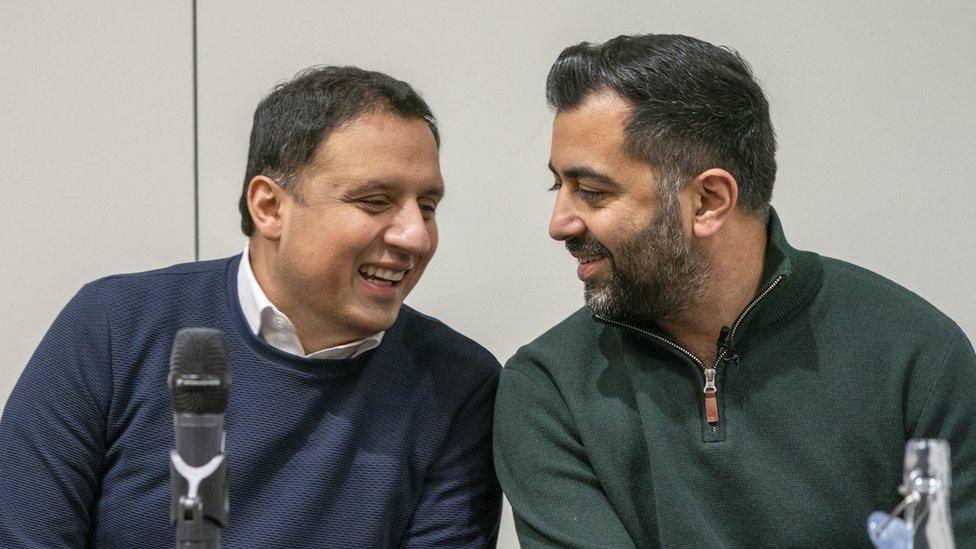
Humza Yousaf and Anas Sarwar are not normally this close
Within the SNP, Mr Yousaf has tried to run a more open government than Ms Sturgeon, who became known for controlling everything from within a tight inner circle.
Mr Yousaf has sought to give his cabinet more agency, and is more tolerant of dissent from the back benches too.
That is perhaps partly a recognition of how narrow his margin of victory was, but also of a more inclusive approach than his predecessor.
It has, however, created a feeling that the party's famed iron discipline has begun to rust.
Ms Forbes frequently contradicts him on policy, while fellow leadership contender Ash Regan has departed for Alba and SNP stalwart Fergus Ewing is facing suspension for breaking the whip.
The trio are united in their opposition to the Bute House agreement with the Scottish Greens. However Mr Yousaf has displayed loyalty to his partners in government, standing up to defend minister Lorna Slater from a confidence vote.
On the same theme he also displayed staunch support for an embattled colleague when Michael Matheson was embroiled in an almighty mess over the data roaming bill for his parliamentary iPad.
There is a pragmatic side to this too - Mr Yousaf really doesn't need to be replacing his health secretary at a critical time of year for the NHS, and he needs to keep the Greens on side to sustain a majority in parliament.
Michael Matheson made a tearful apology in parliament
As bruising as 2023 has been, the trouble for Mr Yousaf is that there are still more things that can go wrong.
The police investigation is yet to report back, with prosecutors working to decide whether there is sufficient evidence and a public interest to lay charges - the two-part test the Crown Office applies to every case.
The row over the budget is still young, and the council tax freeze hangs in the balance.
For all that inflation has drifted gently down, many still feel their household finances are teetering. Leaders of all parties have detected an appetite for change.
And they may get the chance before long, with a general election expected. The debate about exactly when has grown deeply tedious, but it is coming.
The SNP is still in a dominant position in Scottish politics, but that makes it all the harder to make gains - and even a handful of losses will look like a shift in momentum.
We have learned much about Humza Yousaf's character and leadership through the adversity he has faced in 2023.
He may wish for a 2024 where he can do more to shape events, rather than risk being a leader who is swept along by them.